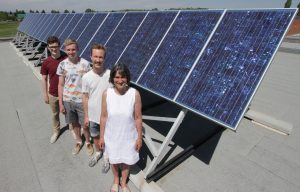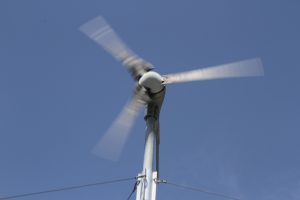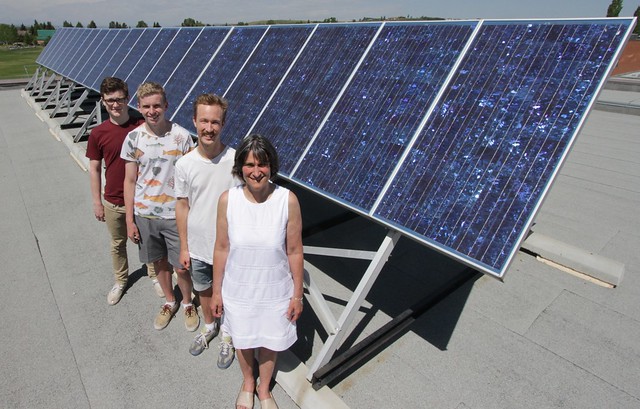By David Dodge and Duncan Kinney
There’s a quote from cultural anthropologist Margaret Mead that you will see tacked up on bulletin boards or floating through your Facebook feed.
“Never doubt that a small group of thoughtful, committed citizens can change the world; indeed, it’s the only thing that ever has.”
To see that quote brought to life we went to Cochrane High School in Cochrane, Alberta about a half-hour west of Calgary.
Tucked within that school of 700 students is a small volunteer club with a fairly bland name – the Sustainable Development Committee. But behind the name is an overachieving group of high school students that has raised more than $149,000 and built more than half a dozen renewable energy projects.

Science teacher Stephanie Bennett with two alumni – all veterans of the Cochrane High School Sustainable Development Committee. Successive committees have built seven major projects at the school including solar, energy efficiency and gardens. Photo David Dodge, GreenEnergyFutures.ca
Stephanie Bennett is a veteran high school science teacher and along with teacher Earl Binder helped start the group in 2004.
“It is strictly a volunteer committee. Nobody gets credits, nobody is being paid for any of this. The beauty of it is that not only are they learning up-to-date, sustainable practices, but they are also meeting some amazing people and having some great experiences,” says Bennett.
Over the past 11 years the committee has been responsible for installing three different solar PV projects on the school roof, a micro-wind turbine, waste heat recovery and a solar thermal hot water system and those are just the energy generation related projects. They’ve installed a school garden fed with rainwater from the roof, installed LED lights, waterless urinals, dual flush toilets, motion activated lights, a solar-powered energy efficient scoreboard and have done a ton of outreach in the community and in nearby schools. They’re wrapping up an outdoor classroom project right now.
“I got involved with it mostly because I always saw myself as someone that wanted to be sustainable,” says Rhett Devlin, a grade 12 student. “I don’t want the world to be wrecked because of my presence here, I guess. I wanted to do something that helps instead of hinders.”
Jay Heule is a Cochrane High grad and former sustainable development committee member. He’s now in his second year of engineering at the University of Calgary.
“Growing up in Cochrane with a bit more of a redneck kind of feeling in town it was a different outlook on how we could approach the environment with solutions for problems that we’re facing here in the 21st century,” says Heule.
The case of the notorious wind turbine

a tiny turbine the students installed in their very first project at Cochrane High School. Photo David Dodge, GreenEnergyFutures.ca
The students may have completed six major sustainability projects in the school, but it hasn’t been all sunshine and rainbows for the sustainable development committee.
When the students decided to fundraise and build a five-kilowatt, 18-metre high wind turbine on school property a vocal group of neighbors responded.
“There was a really loud group, it was called the, ‘The No Turbines in Town Coalition,’ and they were in the newspaper, they were in the media and we really didn’t want to play that game so we just said, “Alright, we’ll go through the school board, we’ll jump through all the extra hoops,” says Adam Sibbald, another sustainable development committee alumni who’s now in his second year of business at UBC.
In fact school board policy prevented the students from being active in the media so they went through the school board, they applied to the Alberta Utilities Commission and then the town of Cochrane. The town put the brakes on the project and decided it needed a framework to deal with energy projects in town.
The students held three community consultation meetings learning how to do good public consultation after “getting shellacked” at the first one.
The students turned their attention from fundraising and project development to engage in real-life politics. It’s a similar challenge that renewable energy proponents have faced in other places – angry residents who don’t want development in their backyard and a leery local government.
And while the student group ultimately failed in their effort to erect the turbine thanks to the push from the students the town of Cochrane now has a renewable energy framework. Any future renewable energy projects (including small wind) now have a much clearer expectation of what they need to do in order to be approved.
“It was a really good learning experience from that aspect, definitely frustrating at times, but I would definitely do it again,” says Heule.
Developing green leaders
And while the sustainable development committee has raised a lot of money and piloted a ton of really cool projects, perhaps the most important part is on the human development side. The experience they’re getting in fundraising, communications, working as a team and working with regulatory bodies is invaluable as they go to post-secondary and join the workforce.
“I’m currently going to school as a civil engineer at the University of Calgary with goals of becoming an architect in the future,” say Heule. “So I’d like to be able to use this experience of dealing with the community and dealing with committees and trying to get petitions to help further my experience and education and work towards sustainable design and development through architecture and buildings.”
Looks like the kids are going to be all right.


